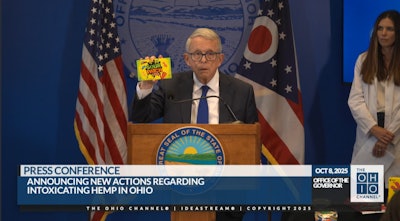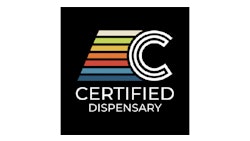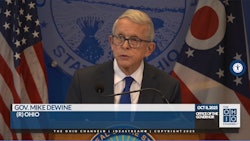
Three Ohio hemp-related businesses filed a lawsuit Oct. 8 against Gov. Mike DeWine following his executive order to halt retailers from selling intoxicating hemp products for 90 days as part of a state of emergency.
The lawsuit, filed in the Franklin County Court of Common Pleas, also names the Ohio Department of Agriculture (ODA) as a defendant. In his executive order, DeWine directed the ODA to adopt emergency regulations, in part, to redefine hemp in a manner that prohibits intoxicating cannabinoid products from being sold outside the state’s licensed and regulated cannabis program.
Under ODA’s draft regulations, the term “intoxicating hemp” would mean a product that contains more than 0.5 milligrams of THC per serving or more than 2 milligrams of THC per package.
The draft regulations also add a definition for THC to mean naturally occurring or synthetic equivalents, regardless of whether artificially or naturally derived, giving the state power to crack down on products like delta-8 THC edibles and beverages. Delta-8 THC is an intoxicating compound that’s often synthetically converted from nonintoxicating CBD.
“Governor DeWine’s purported basis for invoking rulemaking authority is that consumer products containing ‘intoxicating hemp’ are adulterated,” the lawsuit states, arguing that the Ohio Revised Code includes language that the addition of hemp or a hemp product to any other product “does not adulterate” that other product.
“As such, Governor DeWine lacked a basis for invoking emergency rulemaking,” the plaintiffs argue.
The three plaintiffs include Cleveland-based retailer and manufacturer Titan Logistics Group; West Chester-based retailer Fumee Smoke & Vape; and Cincinnati-based manufacturer Invicta Nutraceuticals.
In an affidavit included in the lawsuit, Titan Logistics founder and owner Wesley Bryant attested that hemp products account for almost 100% of Titan’s sales, and that the company’s inventory will degrade with approximately $150,000 of it “rendered unusable” within the next 30 days should the ban be implemented.
As part of DeWine’s executive order, starting on Oct. 14, Ohio companies must stop selling consumer products containing intoxicating hemp, remove them from public display, and either lawfully dispose of them, return them to the manufacturer/supplier, or hold them for disposition by law enforcement, ODA or local health authorities.
According to Bryant, if the governor’s ban goes into effect without injunctive relief from the court, Titan projects an inventory loss of approximately $2.4 million in MSRP value.
“Titan will be forced to permanently cease business operations,” according to Bryant.
DeWine’s executive order and the ODA’s pending emergency regulations will impact more than 4,000 small businesses and family-owned retailers that sell hemp products in Ohio, according to the lawsuit.
The lawsuit acknowledges that hemp-derived cannabinoid products can be sold with no age requirement under Ohio law. DeWine said during an Oct. 8 press conference announcing his executive order that youth access was a major concern driving his decision to declare a state of emergency.
“For intoxicating hemp, this product has no restrictions on where it can be sold or who can buy it,” DeWine said. “Intoxicating hemp has no required regulatory testing at all and is sold in packages enticing to children, many times mimicking the packaging of common candies. … Intoxicating hemp is dangerous, and we need better to protect our children. And, because of that fact, I’ve signed, a few moments ago, several different orders.”
The governor pointed to data from the Ohio Poison Control Center that exposure to delta-8 and delta-9 THC among those 19 years and younger increased from 419 recorded exposures in 2021 to 994 exposures in 2024, including 555 cases involving children younger than 6 last year. “Those are only the ones we know,” DeWine said.
This week’s lawsuit argues that DeWine lacks a basis to issue an executive order because “there is no evidence hemp products pose an imminent threat to public health.”
The lawsuit also points out that in January 2024, DeWine urged state lawmakers to pass legislation to regulate hemp-derived cannabinoid products because his hands were tied on executive action.
The plaintiffs argue that DeWine violated the separation of powers doctrine this week when he took executive action on what they believe should be a legislative matter.
“Despite acknowledging that regulating hemp was a matter for the Legislature, and even though the House and Senate have legislation pending regulating hemp products, Governor DeWine declared a public health state of emergency,” the lawsuit states.
When a reporter asked DeWine during the press conference what had changed from his early 2024 position of lacking the authority to take executive action, the governor said he asked his lawyers to go back and reevaluate the matter after the prolonged period of no legislative solutions arriving at his desk.
“They’ve come to the conclusion that we certainly have the power,” he said of his legal experts. “This crisis is continuing to get worse and worse, and I’m not going to sit by and let this continue.”
Later, DeWine said he doesn’t blame the Legislature. However, the governor’s public health emergency can only last for up to 90 days, at which point it’ll be up to the Legislature on what happens next.
For the plaintiffs and other Ohio hemp-related businesses, 90 days represent a make-or-break timeframe of irreparable harm, including loss of sales, customers, licenses and their entire operations.
Condemning DeWine’s executive order, the U.S. Hemp Roundtable (USHR), a national industry advocacy group, believes the governor was not only “wrong-headed” but acted illegally.
“Governor DeWine’s executive order is a misguided overreach that threatens to shutter hundreds of Ohio small businesses and wipe out millions in legitimate economic activity,” USHR General Counsel Jonathan Miller said. “We are outraged that the governor is attempting to bypass the Ohio Legislature and misuse executive powers to deliver a crushing, job-killing blow to the state’s hemp industry. Hemp products are legal under both Ohio and federal law – this order simply isn’t supported by statute or precedent.”
While the USHR shares DeWine’s goal of ensuring consumer safety and preventing youth access to intoxicating hemp products, Miller said regulation, not prohibition, is the right path forward and that the governor is unfairly targeting companies that follow the law and operate transparently.


























